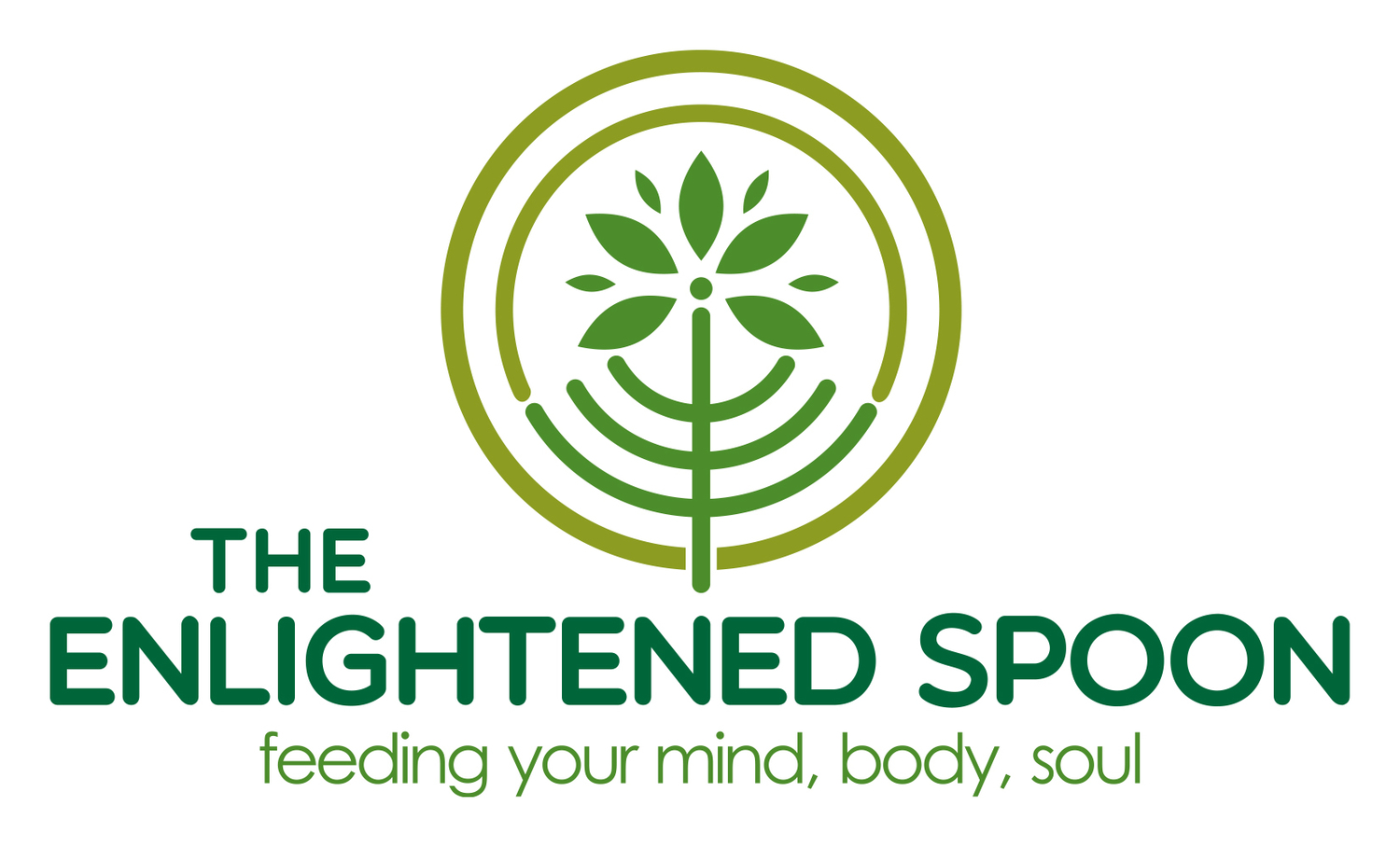Thoughts On My 7 Days of Raw
/Here's the topline of some of my research and personal thoughts on the 7 days I went on raw food. It ended up pretty long, so if you're not interested in the research (HA!), you can skip down to the section on "Final Thoughts".
Let's start with the basics.
WHAT IS RAW FOOD?
1. Raw food is food that hasn’t been heated above 46 degrees C (about 118 degrees F).
2. Raw food hasn’t been denatured by chemicals, pasteurization, or irradiation.
3. Raw food is WHOLE, UNPROCESSED food. Fruit, vegetables, seeds and nuts.
By keeping food as close to its natural state as possible, we can preserve its nutritional content by up to 70-90%. After that it starts to denature as enzymes begin to die and the food is no longer ‘living’.
WHY EAT RAW FOOD?
The idea is external germs are not the cause of disease - opportunistic scavengers appear when the body is weak and out of balance.
Factors Boosting the Health of Our “Internal Biological Terrain”:
- Low levels of toxicity and fermentation.
- Proper range of acid/ alkaline balance.
- High cellular oxygenation.
- High number of probiotic beneficial bacteria.
- Low number of pathogenic microorganisms.
Raw Food Boosts Our “Internal Biological Terrain” By The Following Means:
- Emphasis on organic, plant-based foods which are hydrating and satiating, that also have lower levels of toxicity and fermentation when processed through the body.
- Emphasis on nutrient-dense foods - high in fibre and living enzymes.
- Fruit and vegetables, especially raw leafy greens which are full of chlorophyll, are alkalizing. They help to restore the body’s pH balance, enabling it to heal and regenerate itself.
- Nourishing the liver with raw foods will effectively balance blood sugar, reducing cravings, eliminating excess hormones and producing bile to break down fats and keep cholesterol levels healthy.
- Reduction of saturated fat, sodium and sugar.
Some of the general claims of raw food are summarised nicely in this picture:

(Image reposted from here)
Raw Foodies Claims Against Cooked Food:
- Processing or heating food destroys its natural enzymes, phytonutrients and essential nutrients - 60-70% of vitamins (and up to 96% of vitamin B12) and 100% of phytonutrients are lost through cooking*.
- Eating cooked food produces more waste than our eliminative organs can keep up with. Chemical substances produced by cooking place additional strain on the body’s detoxification organs, such as the liver, gut and kidneys. The liver becomes overworked and cannot detoxify effectively, leading to inflammation which can damage tissues and accelerate the signs of ageing.
- Cooked, processed foods and animal products increase the body’s acidity. This promotes inflammation, lowers immune function and reduces levels of alkaline minerals, such as calcium and magnesium.
This leads to an overall toxic state in the body and results in disease.
Who knew cooking your food could be so dangerous. (!)
*It's also important to point out the flip side to this - that some nutrients can only be accessed through the cooking process. For example, Lycopene in tomatoes is only released when it's cooked. And lots of harmful germs and bacteria are also killed off through the cooking process... So it's not all bad stuff that comes from cooking.
EVALUATING RAW FOOD CLAIMS:
1. Not Enough Research to Back Up Any Claims
There is very little scientific evidence to substantiate the raw food diet claims. The majority are anecdotal claims with not enough or inconclusive research to back them up.
Interestingly - it's also important to point out that all the other dietary models also have a lack of scientific evidence to back up their claims - from the Paleo diet, 5:2 diet, Adam & Eve, Vegan, Blood Type, Macrobiotic, Gluten-Free, to the GAPS/ Specific Carbohydrate Diet, etc.
So... Just because there's insufficient evidence to prove a diet works or not, but if a person feels loads better on a particular diet - does this negate the individual's experience of it? I think this is just testament to how individual we all are as people and just coz one way of eating/ living works for one person, doesn't necessarily mean it will work for another.
2. Raw Food Has Successfully Cured Some Major Illnesses
- Dr. Gabriel Cousens has successfully reversed Type 2 Diabetes through his program at the Tree of Life Center, which has been featured in the documentary "Simply Raw - Reversing Diabetes in 30 days".
- The Gerson Institute has cured some forms of cancer through Gerson Therapy - a strict regime of fresh vegetable juices (up to 13 glasses a day), with three vegetarian meals a day (some cooked), with some supplements and detoxification protocols over a longer-term period.

- Other conditions from kidney disease to psoriasis have also been successfully treated through a raw food diet.
So even if there isn't more scientific research done (yet) on the raw diet - the anecdotal experiences from the few instances above of reversing some pretty major illnesses are very compelling. Especially if you're looking for a dietary model that boosts the detoxification processes.
3. Nutritional Status of a Raw Food Diet
Since this is pretty much a vegan diet, similar guidelines of which nutrients you could be lacking if not eating animal products would apply:
- Vitamin B12
- Vitamin D
- Iron
- Essential Fatty Acids (Omega 3's)
- Proteins
Except for vitamin B12 which will require supplementation, every other nutrient is available from plant sources (or sunshine in the case of vitamin D) - you would just need to be very mindful in watching what you eat and in a wide variety to get a balanced diet.
I think what started to concern me a bit was so many of the raw food bloggers seemed to crave sugar and there were so many recipes available for desserts that could double up as breakfasts too. Don't get me wrong - I have a sweet tooth myself, but if you're craving sweets and carbs ALL THE TIME, you need to figure out if there's some other deeper imbalance such as a protein deficiency or a candida imbalance going on. Dr. John Douillard wrote a good article on the hidden signs of protein deficiency here.
FINAL THOUGHTS
1. Disregarding any of the research from all of the above and just going by my personal experience of it - during my 7 days of raw, I generally felt OK. I didn't have any major energy dips, wasn't hungry all the time (to my surprise), and could also go running a couple times that week and didn't feel like I was drained. Most of all, I never felt over-stuffed from food. No bloating in the gut at all.
Part of me is wondering if it was the raw food that did it, or maybe it was coz I was pretty much gluten-free that week. (I guess my next experiment will be to go gluten-free and see how that feels in the gut!)
I was really mindful in including lots of high-protein, low-GL snacks throughout my days though, so that probably also helped me even out my blood-sugar levels and not get hungry or have an energy crash.
2. As a general detox cleanse, the raw diet can be a good, gentle way to help your body "press the reset button". It's not a hardcore fast that stops the digestive system, and still offers some nourishment while taking a bit of the load off your eliminative organs.
3. I will probably be riling up some raw foodies here, but for me - Going 100% raw day-to-day doesn't seem wise for the long-term. Many raw food gurus also admit to not being 100% raw all of the time. A mix of something like 80% raw, 20% cooked food seems to be what most people end up doing. The danger in going 100% raw for the long-term (and not looking to cure any disease state) is your body basically kicks into "detox mode"... but at some point, you will need to stop detoxing it and start nourishing it.
4. As with all things in life - finding that right balance is key. It all depends on what stage you're at in life, what season in the year it is (going raw in Summer makes sense - but in the dead of the Dutch winter? No thanks!), what other factors are going on in your life that may change your nutritional needs, what your constitution is like and whether it can handle uncooked food - all also play a role.
5. The one thing I took out of this is: if you want to ensure you're eating good food (where did it come from? How was it prepped?), you kinda need to make it yourself (DUH!) But how many of us actually have the time to do this? A lot of it is prepping ahead of time - and while it may seem like a mission at first to get more organized, once you start getting into the routine and it becomes habit, it starts to get easier.
I'm trying to incorporate some of these "prep ahead" techniques into my day and have been soaking raw oats and chia overnight for porridge the next day. I've also been bringing my green smoothies into work as either a mid-morning or mid-afternoon snack - it sure beats the coffee!

6. Which reminds me - I've continued on the coffee detox since April 1st. It's been slightly over a month now that I've been off the coffee. Not completely off caffeine as I have the occasional green tea or earl grey tea... I'm just doing this as an exercise to wean myself off using coffee as a stimulant. I love its taste, I love its kick... but I also know I was using it to wake myself up in the mornings, and that's not the kind of strain I want to be putting on my adrenals and hormonal system first thing in the AM.
7. I've developed an interest in alternative methods of prepping food because of this. Stuff like: fermenting and making my own kimchi, kombucha, saurkraut have become more frequent in my kitchen. I've also signed up as a lifetime member with Russell James, The Raw Chef - signing on to take up more raw courses with him. I'm still working up the nerve to take the raw chocolate course (I hate baking. Granted, this isn't "baking" per se, but its made me have an aversion to anything to do with making sweets/ dessert), so maybe that's one I'll do in person with his partner in raw, Amy Levin of Ooosha. :)
If anything - trying something out of your comfort zone definitely opens up new ways of looking at the world around you. I've been joking that raw food prep from dehydrating to sprouting, fermenting, spiralizing, etc. are all essentially different ways to disguise a salad. Ha. I've been having fun discovering ways to get different textures and flavours out of fruit, veggies, nuts and seeds. On the surface, it seems like there's only so much you can do with them, but I see this differently now.
I think that pretty much wraps this up. I can't seem to write short blog posts (LOL) and if you've made it up to here, congrats! Thank you for being interested in my journey - I hope it helps to spark some interest in how you can kickstart your way back to good health too. :)
----------------------
REFERENCES:
- Bailey, C (2012). The Raw Food Diet. 1st ed. London: Duncan Baird Publishers Ltd.
- Balch, P (2010). Prescription for Nutrional Healing. 5th ed. USA: Avery Penguin Group.
- Billings, T (1997). Idealism vs. Realism in Raw Foods. Available at: http://www.beyondveg.com/billings-t/ideal-real/idealism-realism-1a.shtml. Last accessed 28th March 2014.
- Clement, B. DiGeronimo, T (1996). Living Foods for Optimum Health. New York: Three Rivers Press.
- Cousens, G (2003). Rainbow Green Live-Food Cuisine. USA: North Atlantic Books & Gabriel Cousens, M.D.
- Cousens, G (2014). Why Live Foods. Available: http://treeoflifecenterus.com/why-live-foods/. Last accessed 18th April 2014.
- Culler, V (2002). The Science Behind Raw Food. Available: http://serendip.brynmawr.edu/biology/b103/f02/web2/vculler.html. Last accessed 28th March 2014.
- Elliot, A (2009). Simply Raw: Reversing Diabetes in 30 Days (Documentary). Available: http://www.rawfor30days.com. Last accessed 22nd April 2014.
- Fuhrman, J (2004). The Cold Truth About Raw Food Diets. Available: http://www.diseaseproof.com/archives/healthy-food-the-cold-truth-about-raw-food-diets.html. Last accessed 10th April 2014.
- Graham, D (2006). The 80/10/10 Diet. USA: FoodnSport Press.
- Knowler, K (2014). The Raw Food Coach. Available: http:// therawfoodcoach.com. Last accessed 14th April 2014
- Katz, D (2012). The Raw Food Diet, Overcooked. Available: http://www.huffingtonpost.com/david-katz-md/raw-food-diet_b_2015598.html. Last accessed:14th April 2014.
- Langley, S. (2011) The Naturopathy Workbook. 3rd ed. London: CNM.
- Lenz, N (2014). Raw School: Basic Raw Food FAQ. Available: http://rawschool.com/raw-food-basics/. Last accessed 18th April 2014.
- Subramanian, S (2009). Fact or Fiction: Raw Veggies Are Healthier Than Cooked Ones. Available: http://www.scientificamerican.com/article/raw-veggies-are-healthier/. Last accessed 15th April 2014.
- The Gerson Institute (2011). The Gerson Therapy. Available: https://gerson.org/gerpress/the-gerson-therapy/. Last accessed 22nd April 2014
- Tu, J-L (1999). Discussion: 100% vs. Predominantly Raw. Available at: http://www.beyondveg.com/tu-j-l/raw-cooked/raw-cooked-3a.shtml. Last accessed 23rd March 2014.
- Tu, J-L (1999). What Kind of Combined Raw/ Cooked Diet? Making Intelligent Choices. Available at: http://www.beyondveg.com/tu-j-l/raw-cooked/raw-cooked-3b.shtml#whatmixeddieta. Last accessed 23rd March 2014.
- Wanjek, C (2006). The Raw Food Diet: A Raw Deal. Available: http://www.livescience.com/889-raw-food-diet-raw-deal.html. Last accessed 22nd April 2014
- Wignall, J (2013). Raw & Simple. USA: Quarry Books.
- Young, R and S (2002). The pH Miracle. 7th ed. USA: Warner Books, Inc. p135.
- Zavasta, T. (2014). Nature Always Right, Cooks Never: Why Eat Raw? Available at: http://www.beautifulonraw.com/why_raw_food.html. Last accessed: 15th April 2014.









